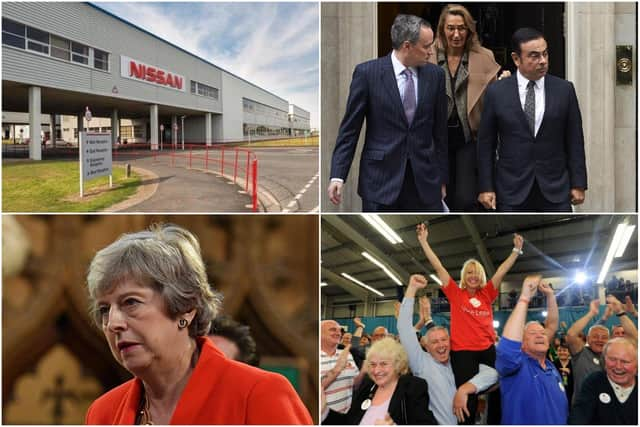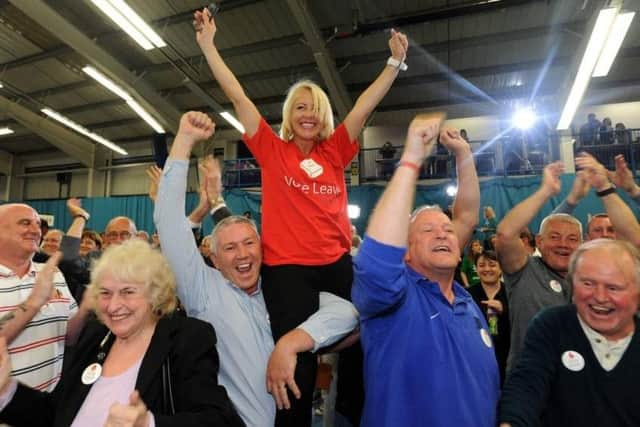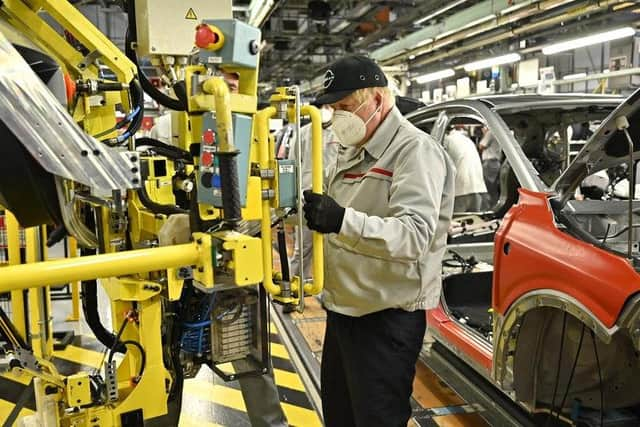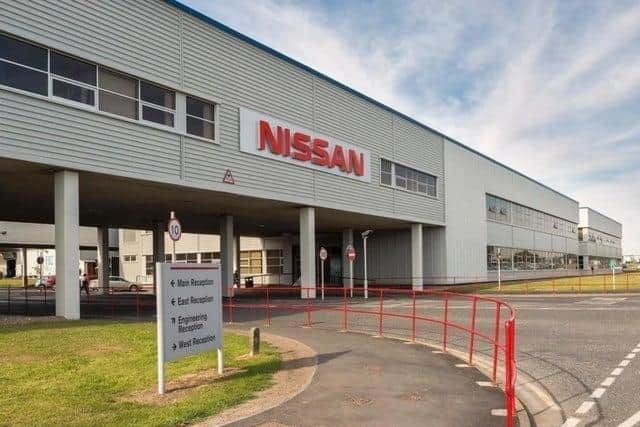Nissan and Brexit - five years of uncertainty end as carmaker commits its future to Sunderland
and live on Freeview channel 276
Prime Minister Boris Johnson visited the plant as Nissan confirmed it was to create a flagship Electric Vehicle (EV) Hub and build new batteries and another electric car in the city.
It brings an end to speculation over the impact Britain’s decision to leave the EU would have on the factory.
Advertisement
Hide AdAdvertisement
Hide AdSunderland became a byword for Brexit in more ways than one in the immediate aftermath of the vote on June 23, 2016.


Pictures of ecstatic Leave voters celebrating at the count provided the first real hint that the pundits’ prediction of a Remain win had been wide of the mark.
Sunderland’s result, announced just after 12.20am that night, saw the city voting by 61 per cent to 39 per cent in favour of quitting the EU – a far larger margin than anticipated.
So seismic was the shock result’s implication for the national vote that within less than five minutes, the pound had fallen from 1.50 to 1.43 against the US dollar as the markets flew into a panic.
Advertisement
Hide AdAdvertisement
Hide AdIn reality, Sunderland was far from the most pro-Leave part of the country – in fact, it doesn’t even make the top 20 list in terms of percentage of Leave vote.


But those first pictures established an indelible link in the public consciousness, for better or worse, between Sunderland and Brexit.
Of course, the second factor linking the two was Nissan.
Ready access to the EU and the ready access opened up by membership of its Customs Union to a huge potential market had been a massive factor in attracting Nissan to invest in the UK in the first place and the subsequent introduction of the Single Market in the early 90s had only made membership of the EU more attractive to the firm.


As the Brexit vote approached, Nissan took a deliberately neutral line, not going so far as to recommend to staff which way to vote, though chairman and chief executive Carlos Ghosn made clear in February 2016 where the firm’s sympathies lay: "Our preference as a business is, of course, that the UK stays within Europe – it makes the most sense for jobs, trade and costs,” he said.
Advertisement
Hide AdAdvertisement
Hide Ad"For us, a position of stability is more positive than a collection of unknowns."
Less than three months after the referendum, Japan warned about the possible impact of EU withdrawal on all of its firms operating in the UK, including Nissan.
Soon, however, all fears for the plant’s future seemed to have been put to rest, with a meeting between Carlos Ghosn and Prime Minister Theresa May in Downing Street followed within days by the announcement that Nissan was to build but one but two new models on Wearside – a new X-Trail and the third generation of the best-selling Qashqai.


The carmaker and the Government denied that a special ‘sweetheart deal’ had been made, with Business Secretary Greg Clark saying during an appearance on Question Time: "There's no chequebook. I don't have a chequebook."
Advertisement
Hide AdAdvertisement
Hide AdIt would emerge in 2019, however, that Mr Clark had, in fact, offered Nissan support of up to £80million to build new models in Sunderland.
Boris Johnson remained tight-lipped over Government support for the plant.
Mr Johnson has said the level of public money the Government has used to support Nissan building a new electric model and huge battery plant in the UK is “confidential”.
During a visit to the plant in Sunderland, the Prime Minister told reporters: “There are ongoing discussions about ways we can support people who are going to bring fantastic green technology into this country.
Advertisement
Hide AdAdvertisement
Hide Ad“Obviously they’re confidential but this is something that is a massive benefit to the UK economy.”


Brexit continued to cast a shadow over the future of Nissan in Sunderland until late last year.
In June 2018, two full years after the vote, Carlos Ghosn was been reported to have said the company's investment plans would be put on hold until there was more clarity on the UK's trading relationship with Europe post-Brexit.
And on a visit to the plant the following year, European chairman Gianluca de Ficchy warned ten per cent tariffs after a no-deal Brexit would mean Nissan’s European business model – including its UK operation – would ‘not be sustainable’.
Advertisement
Hide AdAdvertisement
Hide Ad“If a No-deal scenario means a sudden application of the WTO (World Trade Organisation) tariffs, we know that in that case our business model won’t be sustainable in the future,” he said.
The new Juke was a car 'conceived for the European market', with 70 per cent of production to be exported to the EU: “Our industry is an industry that works with lower margins and if we are in a situation in which tomorrow, we will have to apply 10 per cent export duties to 70 per cent of our production, the entire business model of Nissan in Europe will be in jeopardy.”
Concern over the possible impact of a no-deal Brexit on the plant was such that a series of protests was held outside the factory – but on Christmas Eve came the news that after months of talks and last-minute wrangling, a post-Brexit trade deal had been agreed by negotiators from the UK and the European Union.
And on a visit to Sunderland in Janaury, global chief operating officer Ashwani Gupta said the deal had given the plant a competitive advantage and secured the future of thousands of jobs across Europe, the pledged the firm would ‘take this opportunity to redefine the auto industry in the United Kingdom’.
